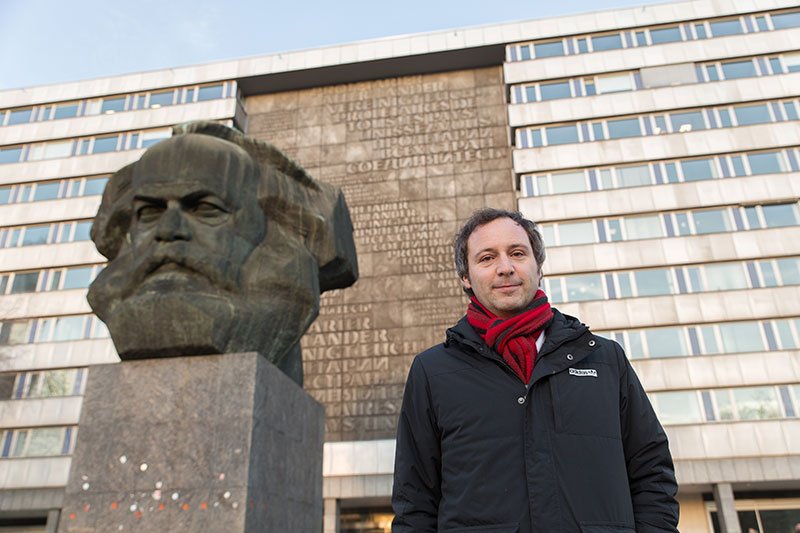A Focus on Changes in Working Life
Eleven questions for Prof. Dr Markus Hertwig, Professor of Sociology with Specialization in Work and Organization since June 2015
-

Prof. Dr Markus Hertwig builds a bridge from one attraction of the City of Chemnitz to his field of interest: "Karl Marx sustainably dominated especially the sociology of work for decades and many of his ideas still help to understand forms and changes in work and organization." Photo: Steve Conrad
Prof. Dr Markus Hertwig (43) has held the Professorship of Sociology with Specialization in Work and Organization since June 2015. In eleven responses he gives “University News“ readers an insight into his professional background, scientific objectives, and activities in Chemnitz.
What is actually meant by sociology with specialization in work and organization?
Work and organization are two distinguished disciplines of sociology, when you have a close look. Often, however, both are considered together, because the changing world of work is always conveyed by organizations – especially companies, but also associations and consortiums. I’m mainly focussing on the areas of transnationalization and digitalization of work, personnel policies, and transformation of relations between employers and employees, industrial and labor relations.
The TU Chemnitz is the right choice for me as a professor, because…
...I experience the university’s environment as very inspiring, and numerous opportunities for cooperation are on the doorstep.
Can you say a few words about your academic career so far?
I obtained my degree in Social Science at the Ruhr-Universität Bochum in the year 2000. Then I worked for an Internet start-up, where we programmed websites, for example for Volkswagen. But finally scientific work allured me. Then I worked as research assistant at the university in Bochum until 2010. During this time, I did my doctorate with an organizational sociological thesis about the use of Internet in the automotive supply industry. Afterwards, I transferred to the Institute for Work, Skills and Training at the University of Duisburg-Essen for further research projects.
Describe your years of study in only a few words.
A very inspiring and insightful time, because my studies were very broad and interdisciplinary.
Did you have role models during your studies who encouraged you to pursue a scientific career?
Yes, many – some were university lecturers, but most I knew only from their publications and not personally. People who influenced me were always those who conveyed different points of view on supposedly familiar facts.
Do you have any advice for young students and graduates?
Keep in mind not only the labor market, but also your own interests and desires – begin early to think about where you want to go in your life and how you imagine your professional life.
What would you like to achieve in your teachings in the future?
First of all, I try to engross students in the exciting and diverse topics of research about work and organization. Specifically, I imagine a stronger specialization in the field of work and new technologies, which also works across disciplines, as well as a better integration of teaching and research, and a more internationalized profile, which makes the university interesting in Germany and beyond.
What impact does your research have at the TU Chemnitz?
To me it’s always about dealing with current and socially relevant issues. The world of work is going to change substantially due to internationalization and increasing technicality. I want to conduct research on these processes and their impact on work, on strategies and structures of organizations, and on national employment systems.
There are around 45,000 professors at German universities. What distinguishes you from all others?
I’m afraid therefore I still lack the overview. My colleagues might like to judge this in a few years...
What is your favorite place to show guests in Chemnitz?
The Karl Marx Monument. Due to its historical symbolism, but above all because Marx sustainably dominated especially the sociology of work for decades, and many of his ideas still help to understand forms and changes in work and organization.
How do you play a part in the life of the city?
Unfortunately, it is more a passive role up to now – I consume the city’s attractions first of all. That being said, there are numerous opportunities to involve local enterprises or associations in research. I already realized a study in companies in Chemnitz back in 2008 – now I’ll try to revive these old contacts.
Further information about the professorship (in German) at: https://www.tu-chemnitz.de/hsw/soziologie/Professuren/Arbeit_und_Organisation/index.php
Katharina Thehos
29.01.2016




